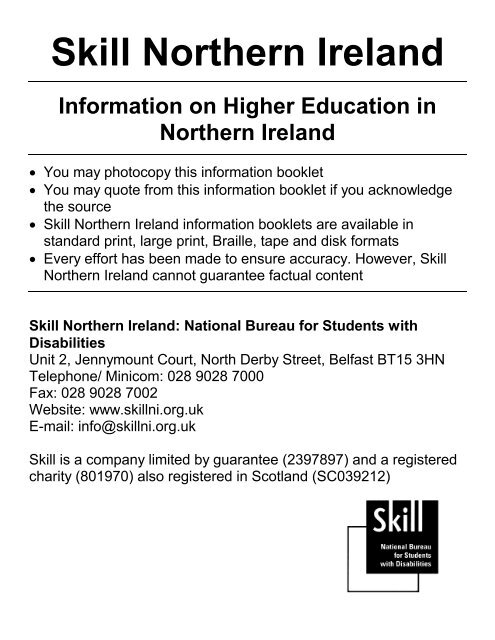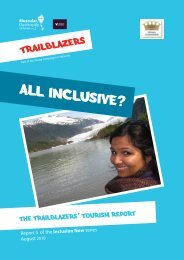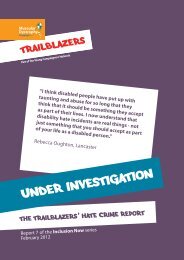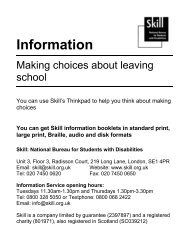Higher education in Northern Ireland - Trailblazers
Higher education in Northern Ireland - Trailblazers
Higher education in Northern Ireland - Trailblazers
Create successful ePaper yourself
Turn your PDF publications into a flip-book with our unique Google optimized e-Paper software.
Skill <strong>Northern</strong> <strong>Ireland</strong><br />
Information on <strong>Higher</strong> Education <strong>in</strong><br />
<strong>Northern</strong> <strong>Ireland</strong><br />
• You may photocopy this <strong>in</strong>formation booklet<br />
• You may quote from this <strong>in</strong>formation booklet if you acknowledge<br />
the source<br />
• Skill <strong>Northern</strong> <strong>Ireland</strong> <strong>in</strong>formation booklets are available <strong>in</strong><br />
standard pr<strong>in</strong>t, large pr<strong>in</strong>t, Braille, tape and disk formats<br />
• Every effort has been made to ensure accuracy. However, Skill<br />
<strong>Northern</strong> <strong>Ireland</strong> cannot guarantee factual content<br />
Skill <strong>Northern</strong> <strong>Ireland</strong>: National Bureau for Students with<br />
Disabilities<br />
Unit 2, Jennymount Court, North Derby Street, Belfast BT15 3HN<br />
Telephone/ M<strong>in</strong>icom: 028 9028 7000<br />
Fax: 028 9028 7002<br />
Website: www.skillni.org.uk<br />
E-mail: <strong>in</strong>fo@skillni.org.uk<br />
Skill is a company limited by guarantee (2397897) and a registered<br />
charity (801970) also registered <strong>in</strong> Scotland (SC039212)
<strong>Higher</strong> Education <strong>in</strong> <strong>Northern</strong> <strong>Ireland</strong><br />
Contents<br />
1. Introduction 1<br />
2. What is higher <strong>education</strong>? 2<br />
3. Decid<strong>in</strong>g where to study 4<br />
4. Apply<strong>in</strong>g for a higher <strong>education</strong> course 7<br />
5. <strong>Higher</strong> <strong>education</strong> providers <strong>in</strong> <strong>Northern</strong> <strong>Ireland</strong> 10<br />
6. Disabled Students’ Allowance 14<br />
7. Further sources of <strong>in</strong>formation 16<br />
Page<br />
1. Introduction<br />
Go<strong>in</strong>g <strong>in</strong>to higher <strong>education</strong> can be a very excit<strong>in</strong>g experience.<br />
Be<strong>in</strong>g fully prepared means that you can spend less time worry<strong>in</strong>g<br />
and more time study<strong>in</strong>g and hav<strong>in</strong>g fun.<br />
This leaflet aims to provide <strong>in</strong>formation about higher <strong>education</strong> <strong>in</strong><br />
<strong>Northern</strong> <strong>Ireland</strong>. Many students beg<strong>in</strong> higher <strong>education</strong> when they<br />
are 17 or 18 years old, but it is becom<strong>in</strong>g more and more common<br />
for people to start courses of higher <strong>education</strong> at any age.<br />
There are many issues that have to be considered. All students will<br />
need to ask questions about what course to do, where the course is<br />
available and what facilities are provided <strong>in</strong> colleges. In addition,<br />
they should consider whether they want to study by attend<strong>in</strong>g a<br />
university <strong>in</strong> campus, or whether supported distance learn<strong>in</strong>g would<br />
be a better option for their circumstances. Disabled students will<br />
probably have other questions too. For example, will the university<br />
be able to provide learn<strong>in</strong>g materials <strong>in</strong> Braille? Will the lecture halls<br />
be accessible to me as a wheelchair user? Will the college<br />
Page 1 of 21
qualifications. It can also give you a chance to jo<strong>in</strong> <strong>in</strong> other activities,<br />
develop new skills, ga<strong>in</strong> new experiences and meet new people.<br />
Where can I f<strong>in</strong>d <strong>in</strong>formation about courses?<br />
Prospectuses<br />
Directories<br />
UK Course<br />
Provider<br />
Websites<br />
These set out the courses available at<br />
<strong>in</strong>dividual <strong>in</strong>stitutions. You can obta<strong>in</strong> these<br />
free of charge by contact<strong>in</strong>g the university or<br />
college’s admissions service.<br />
Careers libraries keep course directories, for<br />
example, the ‘UCAS (Universities and Colleges<br />
Admissions Service) Directory’ and ‘University<br />
and College Entrance: The Official Guide’, also<br />
published by UCAS. See Useful Publications<br />
section at the end of the leaflet for further<br />
details<br />
CD-ROM database of HE courses <strong>in</strong> the UK<br />
usually found <strong>in</strong> careers offices<br />
The UCAS website (www.ucas.ac.uk) has a<br />
search facility which allows you to access<br />
<strong>in</strong>formation on higher <strong>education</strong> courses at<br />
<strong>in</strong>stitutions around the country. You will also<br />
f<strong>in</strong>d l<strong>in</strong>ks to the homepages of the universities<br />
or colleges themselves.<br />
Page 3 of 21
3. Decid<strong>in</strong>g where to study<br />
<strong>Higher</strong> <strong>education</strong> courses are provided <strong>in</strong> <strong>Northern</strong> <strong>Ireland</strong>’s three<br />
universities (Queen’s University Belfast, the University of Ulster and<br />
the Open University.) Many of the further <strong>education</strong> colleges here<br />
also offer higher <strong>education</strong> courses. This leaflet only provides<br />
<strong>in</strong>formation on study <strong>in</strong> <strong>Northern</strong> <strong>Ireland</strong>.<br />
You can apply to up to six <strong>in</strong>stitutions through UCAS. Note that the<br />
Open University is different – you should apply directly to them. You<br />
can still apply to other universities (such as Queens and Ulster)<br />
through UCAS at the same time. You may be tempted to apply only<br />
to <strong>in</strong>stitutions which have good provision for disabled students, or<br />
one that is closest to you. But take care - choos<strong>in</strong>g the right<br />
<strong>in</strong>stitution and course for you as an <strong>in</strong>dividual is very important. A<br />
good way to start is to write a list of the places that offer the courses<br />
you want. Then th<strong>in</strong>k through the other issues that might be<br />
important to you as a student. The follow<strong>in</strong>g list <strong>in</strong>cludes possible<br />
examples of some of these.<br />
• Academic considerations:<br />
Facilities and reputation of the college?<br />
What subjects are taught?<br />
Academic support such as a personal tutor?<br />
Library facilities?<br />
Careers service?<br />
• Location:<br />
Near home?<br />
Away from home?<br />
On campus?<br />
Or by supported distance learn<strong>in</strong>g, study<strong>in</strong>g at home?<br />
Page 4 of 21
Campus or multi site?<br />
In the city/ town or suburbs?<br />
Near to transport, such as bus or tra<strong>in</strong> station or taxi service?<br />
• Student community:<br />
How many students are there? (Is the university small or<br />
large?)<br />
What age groups?<br />
• Access:<br />
To lecture theatres and teach<strong>in</strong>g rooms?<br />
To the library, the books, photocopier, etc?<br />
To a park<strong>in</strong>g space?<br />
To the bar and canteen?<br />
To sports facilities?<br />
In other ways, such as <strong>in</strong>duction loops, clear signs, good<br />
light<strong>in</strong>g.<br />
• Disability support:<br />
Is there good, clear <strong>in</strong>formation available about how the<br />
<strong>in</strong>stitution meets the needs of <strong>in</strong>dividual students with<br />
disabilities?<br />
Are there any particular facilities for disabled students? For<br />
example, Braille embosser, dyslexia support tutor, sign<br />
language <strong>in</strong>terpreter, note-takers, campus m<strong>in</strong>ibus. If these are<br />
not available, can they be arranged <strong>in</strong> time for the start of your<br />
course? If you need medical treatment, is there a suitable<br />
centre available locally or on campus?<br />
Page 5 of 21
• Accommodation:<br />
Private accommodation –<br />
Cost?<br />
Location?<br />
Size/accessibility of rooms?<br />
Safety?<br />
On campus –<br />
Cost?<br />
Catered or self-cater<strong>in</strong>g?<br />
Rooms for disabled students?<br />
Lifts?<br />
Laundry facilities?<br />
Integrated with other students?<br />
Will they <strong>in</strong>stall equipment or make adaptations?<br />
Safety?<br />
Fire procedures for disabled students?<br />
Will they provide a room for your personal assistant if you have<br />
one?<br />
• Recreation and leisure:<br />
Town facilities, shops, banks, c<strong>in</strong>ema, theatre, sports, hobbies,<br />
students’ union, societies, nightlife?<br />
Accessibility of the local area? It is important to be able to<br />
access the local area as well as the college, especially if you<br />
are liv<strong>in</strong>g away from home.<br />
Part-time job opportunities?<br />
Page 6 of 21
4. Apply<strong>in</strong>g for a higher <strong>education</strong> course<br />
The application form<br />
- Apply through the Universities and Colleges Admissions Service<br />
(UCAS) for most first degrees, Diplomas of <strong>Higher</strong> Education,<br />
<strong>Higher</strong> National Diplomas and some University Diplomas. You<br />
can get forms from the careers services or directly from UCAS.<br />
You can also apply onl<strong>in</strong>e at www.ucas.ac.uk.<br />
- Apply through the Nurs<strong>in</strong>g and Midwifery Admissions Service<br />
(NMAS) for diplomas <strong>in</strong> nurs<strong>in</strong>g.<br />
- Apply through the Social Work Admissions System (SWAS) for<br />
diplomas <strong>in</strong> social work.<br />
- Apply to the Open University directly, by application form, by<br />
telephone or onl<strong>in</strong>e.<br />
- The details for all of these are at the end of this leaflet.<br />
Giv<strong>in</strong>g <strong>in</strong>formation about your disability or impairment<br />
Most application forms ask if you are disabled and ask you to give<br />
details of <strong>in</strong>dividual needs. Many people worry that disclos<strong>in</strong>g their<br />
disability or impairment at this stage may open them to<br />
discrim<strong>in</strong>ation. Some of the th<strong>in</strong>gs you may want to consider are<br />
listed below. (However, please note that, because the Open<br />
University has an open entry policy, although the first three po<strong>in</strong>ts<br />
are particularly pert<strong>in</strong>ent, many of the other issues are not relevant<br />
<strong>in</strong> this context.<br />
• Be<strong>in</strong>g fair to yourself: Tell<strong>in</strong>g the <strong>in</strong>stitution <strong>in</strong> advance can help<br />
them to prepare and arrange support for you before the start of<br />
your course. You do not want to spend the first week of term<br />
sett<strong>in</strong>g up support when everyone else is go<strong>in</strong>g to parties and<br />
mak<strong>in</strong>g new friends!<br />
Page 7 of 21
• Be<strong>in</strong>g fair to the college: Changes may need to be made or<br />
staff may need tra<strong>in</strong><strong>in</strong>g before you arrive. They need time for this.<br />
• Expla<strong>in</strong><strong>in</strong>g someth<strong>in</strong>g: You may need to mention your disability<br />
or impairment <strong>in</strong> order to expla<strong>in</strong> someth<strong>in</strong>g. For example your<br />
disability may have affected your school career or you may have<br />
done exams later than most other people.<br />
• So that the <strong>in</strong>formation comes from you: Head teachers or<br />
tutors from your previous school or college who are writ<strong>in</strong>g your<br />
confidential reference may mention your disability if they th<strong>in</strong>k it is<br />
significant.<br />
• Discrim<strong>in</strong>ation: Unfortunately universities are still able to reject a<br />
disabled person’s application for reasons of his or her disability.<br />
As a failsafe, UCAS and other clear<strong>in</strong>g houses allow you an extra<br />
choice of college if you receive a rejection because of your<br />
disability.<br />
• It's the way you tell it<br />
The decision about what to write is yours - you should put down<br />
what you feel comfortable with. Beware of us<strong>in</strong>g terms that<br />
admissions tutors will not understand. The <strong>in</strong>stitution is <strong>in</strong>terested<br />
<strong>in</strong> two th<strong>in</strong>gs: how your disability or impairment may affect your<br />
studies and what they need to know to give you the right support.<br />
If you cannot fill <strong>in</strong> the form yourself<br />
Ask someone to type or write your answers for you. Your referee<br />
can expla<strong>in</strong> the method used and the reasons for it <strong>in</strong> the<br />
confidential report.<br />
Page 8 of 21
Selection <strong>in</strong>terviews<br />
If you have an <strong>in</strong>terview, let the <strong>in</strong>stitution know if you need any<br />
particular arrangements. You may be asked about your disability, for<br />
example, about adapt<strong>in</strong>g course material to suit your needs. Be<br />
prepared to speak clearly and confidently about potential problems<br />
and solutions.<br />
Offers<br />
Admissions tutors decide whether to offer you a place and the offer<br />
will usually be a conditional offer. This means that your exam results<br />
must meet the grade requirements of the course.<br />
Rejections<br />
Institutions rarely give reasons for a rejection. If you th<strong>in</strong>k you have<br />
been rejected because of your disability, contact the <strong>in</strong>stitution to<br />
f<strong>in</strong>d out. If they confirm that they have rejected you for reasons of<br />
your disability, <strong>in</strong>form UCAS and they will give you another choice.<br />
If you end up without a place<br />
If you do not receive any offers or you do not achieve the exam<br />
results you need, do not panic. Call the <strong>in</strong>stitution to see if they will<br />
take you if you were close to the results you needed. Places on the<br />
course could still be open. Otherwise, there are three further<br />
options:<br />
• Clear<strong>in</strong>g From July to September, <strong>in</strong>stitutions can have another<br />
look at applications. If you did not receive any offers, decl<strong>in</strong>ed all<br />
offers, were unsuccessful <strong>in</strong> gett<strong>in</strong>g the results needed or applied<br />
after 30 June, you will automatically receive a Clear<strong>in</strong>g entry form<br />
with <strong>in</strong>struction details. If you have complicated care needs, this<br />
option may be <strong>in</strong>appropriate for you. It is difficult to set up support<br />
<strong>in</strong> the short time before the start of term.<br />
Page 9 of 21
• Retak<strong>in</strong>g If you are determ<strong>in</strong>ed to take a particular course,<br />
retak<strong>in</strong>g exam<strong>in</strong>ations may allow you to reapply next year. It is<br />
worthwhile ask<strong>in</strong>g <strong>in</strong>dividual <strong>in</strong>stitutions about their admissions<br />
policies as better grades may be expected.<br />
• Reth<strong>in</strong>k<strong>in</strong>g Th<strong>in</strong>k about alternative courses or a career path that<br />
does not <strong>in</strong>volve higher <strong>education</strong>. Talk over your options with a<br />
careers adviser.<br />
5. <strong>Higher</strong> <strong>education</strong> providers <strong>in</strong> <strong>Northern</strong> <strong>Ireland</strong><br />
Queen’s University Belfast<br />
University Road<br />
Belfast BT7 1NN<br />
Tel: 028 9024 5133<br />
Fax: 028 9024 7895<br />
Website: www.qub.ac.uk<br />
Disability Services Coord<strong>in</strong>ator: L<strong>in</strong>da Maguire<br />
Tel/ M<strong>in</strong>icom: 028 9033 5511<br />
Fax: 028 9033 5378<br />
E-mail: disability.office@qub.ac.uk<br />
Queen’s welcomes and encourages applications from students with<br />
disabilities. We will endeavour to ensure that all your <strong>in</strong>dividual<br />
requirements are met to ensure your time at Queen’s is an<br />
enjoyable and positive experience. The university has developed<br />
the range of services available for students with disabilities.<br />
Disability Services would be delighted to meet with prospective<br />
students to discuss their <strong>in</strong>dividual requirements and the types of<br />
support available, <strong>in</strong>clud<strong>in</strong>g the arrangement of note takers,<br />
proofreaders, equipment etc. On confirmation of acceptance onto<br />
Page 10 of 21
your course, staff can assist you with your application for Disabled<br />
Students’ Allowances. The Disability Services staff would also be<br />
happy to liase with relevant faculty staff to ensure that they are fully<br />
aware of any support you may require. The age and design of some<br />
of our build<strong>in</strong>gs can cause difficulties with physical access. We<br />
therefore recommend if you are a wheelchair user or have mobility<br />
difficulties, that you contact Disability Services early <strong>in</strong> the year of<br />
application to ensure that this can be addressed. Further details on<br />
the range of services available can be obta<strong>in</strong>ed from the university’s<br />
Guide for Students with Disabilities.<br />
University of Ulster<br />
The University of Ulster has five campuses: Belfast, Colera<strong>in</strong>e,<br />
Portrush, Jordanstown and Magee. The accessibility of our<br />
academic and support provision is constantly under review and<br />
recent <strong>in</strong>vestments have added significantly to the provision of lifts<br />
and other equipment. We encourage people with a disability,<br />
medical condition, mental health difficulty or specific learn<strong>in</strong>g<br />
difficulty eg. dyslexia to apply for places on our courses. The<br />
University seeks to ensure <strong>in</strong>clusion <strong>in</strong> all its courses through<br />
remov<strong>in</strong>g barriers to accessibility. This is achieved through flexible<br />
teach<strong>in</strong>g methods and the provision of facilities and services to<br />
meet <strong>in</strong>dividual student need for equipment, personal assistance or<br />
adaptations to the learn<strong>in</strong>g environment.<br />
Prospective students are encouraged to contact the Disability<br />
Advisers or University Psychologist at an early stage <strong>in</strong> their<br />
application for an assessment of their support requirements. We<br />
welcome general or specific enquiries at any time.<br />
Page 11 of 21
Contact Details<br />
Disability<br />
Awareness<br />
Officer<br />
Disability<br />
Advisers<br />
University<br />
Psychologist<br />
Jennifer<br />
Smyth<br />
Norma<br />
Conn<br />
Liz<br />
Donaghy<br />
Joan<br />
McQuoid<br />
All Campuses Tel:028 90366699<br />
email:ja.smyth@ulster.ac.uk<br />
Jordanstown/Belfast<br />
Colera<strong>in</strong>e/Magee/<br />
Portrush<br />
Tel:028 90366699<br />
email:nc.conn@ulster.ac.uk<br />
Tel: 028 7024105<br />
email:l.donaghy@Ulster.ac.uk<br />
All Campuses Tel: 028 90366336<br />
email:jc.mcquoid@Ulster.ac.uk<br />
Open University<br />
40 University Road<br />
Belfast BT7 1SU<br />
Tel: 028 9024 5025<br />
Fax: 028 9023 0565<br />
Website: www.open.ac.uk<br />
Disability Officer: Charlotte Russell<br />
Tel/ fax: as above<br />
E-mail: ireland@open.ac.uk<br />
The OU's supported open learn<strong>in</strong>g system is ideal for many<br />
disabled students. There are a wide variety of courses on offer: from<br />
14-week <strong>in</strong>troductory courses with targeted places, through to<br />
named higher degrees. Services <strong>in</strong>clude alternative format course<br />
materials (like spiral-bound and audio-recorded books and<br />
transcripts of TV programmes); communication support (like sign<br />
language <strong>in</strong>terpreters and notetakers) at tutorials; free loan of<br />
specialist equipment (like computers, radio aids and talk<strong>in</strong>g<br />
Page 12 of 21
calculators); study guidance materials and support throughout your<br />
course; facilities <strong>in</strong> exam<strong>in</strong>ations and at residential schools. If you<br />
declare a disability, you will be sent <strong>in</strong>formation about the OU’s<br />
services and will be asked to specify those that you require. The<br />
Office for Students with Disabilities co-ord<strong>in</strong>ates these services from<br />
the OU’s headquarters <strong>in</strong> Milton Keynes, with members of the<br />
Disability and Additional Requirements Team <strong>in</strong> your Regional<br />
Centre provid<strong>in</strong>g local support and advice. These are based <strong>in</strong><br />
Belfast, Birm<strong>in</strong>gham, Bristol, Cambridge, Cardiff, East Gr<strong>in</strong>stead,<br />
Ed<strong>in</strong>burgh, Leeds, London, Manchester, Newcastle upon Tyne,<br />
Nott<strong>in</strong>gham and Oxford. F<strong>in</strong>ancial support to help with course fees<br />
and study costs is available <strong>in</strong> certa<strong>in</strong> circumstances. Disabled<br />
Students’ Allowances are also available to OU students: the OU’s<br />
DSA Office adm<strong>in</strong>isters these.<br />
<strong>Higher</strong> <strong>education</strong> provided <strong>in</strong> further <strong>education</strong> colleges<br />
The further <strong>education</strong> colleges <strong>in</strong> <strong>Northern</strong> <strong>Ireland</strong> are listed below.<br />
The Learn<strong>in</strong>g Support Co-ord<strong>in</strong>ator <strong>in</strong> each college has<br />
responsibility for students with disabilities. For more details on each<br />
college, please request the Skill <strong>Northern</strong> <strong>Ireland</strong> <strong>in</strong>formation sheet<br />
Information on Further Education <strong>in</strong> <strong>Northern</strong> <strong>Ireland</strong>. This is<br />
available by telephon<strong>in</strong>g 028 9028 7000 or on the website<br />
www.skillni.org.uk.<br />
Armagh College of Further Education – 028 3752 2205,<br />
www.armaghcollege.ac.uk<br />
Belfast Institute of Further and <strong>Higher</strong> Education – 028 9026 5265,<br />
www.belfast<strong>in</strong>stitute.ac.uk<br />
Castlereagh College – 028 9079 7144, www.castlereagh.ac.uk<br />
Page 13 of 21
Causeway Institute of Further and <strong>Higher</strong> Education – 028 7035<br />
4717, www.causeway.ac.uk<br />
East Antrim Institute of Further and <strong>Higher</strong> Education- 028 9085<br />
5000, www.eaifhe.ac.uk<br />
East Down Institute of Further and <strong>Higher</strong> Education – 028 4461<br />
5815, www.edifhe.ac.uk<br />
East Tyrone College of Further and <strong>Higher</strong> Education – 028 8772<br />
2323, www.etcfhe.ac.uk<br />
Fermanagh College – 028 6632 2431, www.fermanaghcoll.ac.uk<br />
Limavady College of Further and <strong>Higher</strong> Education – 028 7776<br />
1001, www.limavady.ac.uk<br />
Lisburn Institute of Further and <strong>Higher</strong> Education – 028 9267 7291,<br />
www.liscol.ac.uk<br />
Newry and Kilkeel Institute of Further and <strong>Higher</strong> Education – 028<br />
3026 1071, www.nkifhe.ac.uk<br />
North Down and Ards Institute of Further and <strong>Higher</strong> Education –<br />
028 9127 6600, www.ndai.ac.uk<br />
North East Institute of Further and <strong>Higher</strong> Education – 028 9446<br />
3916, www.nei.ac.uk<br />
North West Institute of Further and <strong>Higher</strong> Education – 028 7127<br />
6000, www.nwifhe.ac.uk<br />
Page 14 of 21
Omagh College – 028 8224 5433, www.omagh.ac.uk<br />
Upper Bann Institute of Further and <strong>Higher</strong> Education – 028 3839<br />
7700, www.ubifhe.ac.uk<br />
6. Disabled Students’ Allowance<br />
If you have a disability or specific learn<strong>in</strong>g difficulty and are <strong>in</strong> higher<br />
<strong>education</strong>, you may be able to get extra fund<strong>in</strong>g from the Disabled<br />
Students' Allowances (DSAs). These allowances are <strong>in</strong>tended to<br />
cover any extra costs or expenses you have while you are study<strong>in</strong>g<br />
that arise because of your disability. They are not <strong>in</strong>tended to pay<br />
for:<br />
• disability-related costs that you would have whether you were a<br />
student or not;<br />
• study costs that every student might have.<br />
There are four allowances to cover different areas of need:<br />
• Specialist equipment allowance<br />
• Non-medical helpers’ allowance<br />
• General/other expenditure allowance<br />
• Travel costs<br />
DSAs are not paid <strong>in</strong> set amounts, but are needs based. You will<br />
receive a grant to cover the cost of specific items of equipment,<br />
specific human support costs, and so on. However, there are<br />
maximum amounts for each allowance.<br />
The DSAs are not means-tested, so you get them regardless of the<br />
<strong>in</strong>come of you and your family. There are no ‘previous study’<br />
restrictions or age limits for DSA – you can apply if your course is<br />
Page 15 of 21
eligible, and if you yourself are eligible for student support. This<br />
means that you may be entitled to DSA as a full- or part-time<br />
student on a higher <strong>education</strong> course (see Page 2) at a university<br />
or further <strong>education</strong> college.<br />
To apply for DSA as a student from <strong>Northern</strong> <strong>Ireland</strong> (even if you<br />
<strong>in</strong>tend to study elsewhere <strong>in</strong> the UK), you need to contact your local<br />
Education and Library Board – see the Useful Contacts section of<br />
this leaflet. More <strong>in</strong>formation on what the different allowances can<br />
cover is available <strong>in</strong> Skill’s <strong>in</strong>formation sheet ‘Apply<strong>in</strong>g for<br />
Disabled Students’ Allowance’, but bear <strong>in</strong> m<strong>in</strong>d that the<br />
application process is different <strong>in</strong> <strong>Northern</strong> <strong>Ireland</strong>.<br />
For further help and advice on apply<strong>in</strong>g for Disabled Students’<br />
Allowance, contact Skill <strong>Northern</strong> <strong>Ireland</strong> on 028 9028 7000 or<br />
<strong>in</strong>fo@skillni.org.uk. Alternatively the Disability Officer or Learn<strong>in</strong>g<br />
Support Co-ord<strong>in</strong>ator at your university or college can help you to<br />
apply.<br />
7. Further sources of <strong>in</strong>formation<br />
Useful Publications<br />
There are many directories of higher <strong>education</strong> courses. They can<br />
be found <strong>in</strong> careers and local libraries. Some of them are listed<br />
below:<br />
• UCAS Directory<br />
Published by UCAS. Provides list<strong>in</strong>gs of courses at <strong>in</strong>stitutions<br />
and <strong>in</strong>formation on fill<strong>in</strong>g <strong>in</strong> the application form.<br />
• University and College Entrance: The Official Guide<br />
Published by UCAS. More <strong>in</strong>formation about entry requirements,<br />
Page 16 of 21
courses and <strong>in</strong>stitutions.<br />
Skill publications<br />
To order a publication, contact Skill <strong>in</strong> London on 020 7450 0620.<br />
Alternatively you can fill out an order form on the website<br />
www.skill.org.uk <strong>in</strong> the Information Services section, or ask the<br />
Information Service to send you a publications order form.<br />
Skill <strong>in</strong>formation leaflets<br />
Skill produces a range of <strong>in</strong>formation leaflets, cover<strong>in</strong>g disability<br />
issues <strong>in</strong> post-16 <strong>education</strong>, tra<strong>in</strong><strong>in</strong>g and employment. The follow<strong>in</strong>g<br />
are particularly relevant to higher <strong>education</strong>, however they are not<br />
specific to <strong>Northern</strong> <strong>Ireland</strong> <strong>in</strong> all aspects:<br />
Fund<strong>in</strong>g <strong>in</strong> higher <strong>education</strong><br />
Apply<strong>in</strong>g for the Disabled Students’ Allowances<br />
Personal assistance <strong>in</strong> higher <strong>education</strong><br />
Postgraduate fund<strong>in</strong>g<br />
The Disability Discrim<strong>in</strong>ation Act 1995<br />
How to make a compla<strong>in</strong>t<br />
Apply<strong>in</strong>g to trusts<br />
Improv<strong>in</strong>g access to the physical environment<br />
Exam<strong>in</strong>ation arrangements<br />
Income support<br />
Hous<strong>in</strong>g benefit and council tax benefit<br />
The needs of students with disabilities <strong>in</strong> further and higher<br />
<strong>education</strong><br />
Study<strong>in</strong>g and claim<strong>in</strong>g benefits as <strong>in</strong>capable of work<br />
Specialist equipment <strong>in</strong> <strong>education</strong>: sources of help and <strong>in</strong>formation<br />
Organisations offer<strong>in</strong>g advice or services to disabled students<br />
Community resources<br />
Useful Contacts<br />
Page 17 of 21
Skill NI Information Service<br />
Tel: 028 9028 7000<br />
Email: <strong>in</strong>fo@skillni.org.uk<br />
Fax: 028 9028 7002<br />
As well as the local <strong>in</strong>formation provided through our <strong>Northern</strong><br />
<strong>Ireland</strong> office (see front cover), Skill has an Information Service <strong>in</strong><br />
London.<br />
Freephone: 0800 328 5050<br />
E-mail: <strong>in</strong>fo@skill.org.uk<br />
Website: www.skill.org.uk<br />
Department for Employment and Learn<strong>in</strong>g<br />
Adelaide House<br />
39-49 Adelaide Street,<br />
Belfast BT2 8FD<br />
Tel: 028 9025 7777<br />
Fax: 028 9025 7778<br />
Website: www.delni.gov.uk<br />
Education and Library Boards:<br />
Belfast Education and Library Board<br />
40 Academy Street<br />
Belfast BT1 2NQ<br />
Tel: 028 9056 4000<br />
Fax: 028 9033 1714<br />
Website: www.belb.org.uk<br />
Page 18 of 21
North Eastern Education and Library Board<br />
County Hall<br />
182 Galgorm Road<br />
Ballymena<br />
Tel: 028 2563 6254<br />
Website: www.neelb.org.uk<br />
South Eastern Education and Library Board<br />
Grahamsbridge road<br />
Dundonald<br />
Belfast BT16 2HS<br />
Tel: 028 9056 6200<br />
Fax: 028 9056 6266<br />
Website: www.seelb.org.uk<br />
Southern Education and Library Board<br />
3 Charlemont Place<br />
The Mall<br />
Armagh<br />
Tel: 028 3751 2200<br />
Website: www.selb.org.uk<br />
Western Education and Library Board<br />
1 Hospital Road<br />
Omagh BT79 0AW<br />
Tel: 028 8241 1411<br />
Fax: 028 8241 1400<br />
Website: www.welbni.org<br />
Page 19 of 21
NUS/USI (Union of Students <strong>in</strong> <strong>Ireland</strong>)<br />
29 Bedford Street<br />
Belfast BT2 7EJ<br />
Tel: 028 9024 4641<br />
Fax: 028 9043 9659<br />
E-mail: <strong>in</strong>fo@nistudents.org<br />
Website: www.nistudents.org<br />
The Universities and Colleges Admissions Service (UCAS)<br />
Tel: 01242 222 444<br />
Publications: 01242 227 788<br />
Fax: 01242 544 942<br />
E-mail: enq@ucas.ac.uk<br />
Website: www.ucas.ac.uk<br />
The central admissions system for higher <strong>education</strong> applications.<br />
The Open University<br />
40 University Road<br />
Belfast BT7 1SU<br />
Tel: 028 9024 5025<br />
Fax: 028 9023 0565<br />
Website: www.open.ac.uk<br />
Nurs<strong>in</strong>g and Midwifery Admissions Service (NMAS)<br />
Tel (general enquiries): 01242 544 949<br />
Fax: 01242 263 555.<br />
Website: www.nmas.ac.uk<br />
The nurs<strong>in</strong>g and midwifery admissions service for England.<br />
Page 20 of 21
Department of Health, Social Services and Public Safety<br />
Bursary Adm<strong>in</strong>istration Unit<br />
Central Services Agency<br />
25 Adelaide Street<br />
Belfast<br />
BT2 8FH<br />
Social Work Admissions System (SWAS)<br />
Tel (general enquiries): 01242 544 600.<br />
The admissions service for social work courses – some courses <strong>in</strong><br />
<strong>Northern</strong> <strong>Ireland</strong> recruit through SWAS, others through UCAS.<br />
Further details on apply<strong>in</strong>g to do Social Work can be obta<strong>in</strong>ed from<br />
the <strong>Northern</strong> <strong>Ireland</strong> Social Care Council<br />
Tel: 028 9041 7600<br />
Website: www.niscc.<strong>in</strong>fo<br />
Central Applications Office (Republic of <strong>Ireland</strong>)<br />
Tower House<br />
Egl<strong>in</strong>ton Street<br />
Galway<br />
Tel: 00353 9150 9800<br />
Website: www.cao.ie<br />
Updated October 2004<br />
Page 21 of 21










